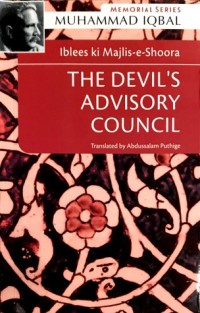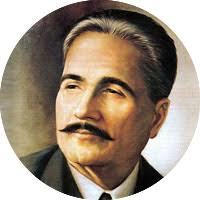
The Devil’s Advisory Council
تأليف : Muhammad Iqbal
النوعية : العلوم الاسلامية
نعتذر، هذا الكتاب غير متاح حاليًا للتحميل أو القراءة لأن المؤلف أو الناشر لا يسمح بذلك في الوقت الحالي.
The Devil’s Advisory Counbycil: Iblees ki Majlis-e-Shoora by Muhammad Iqbal..Iblees ki Majlis-e-Shoora is a conversation between Iblees (the devil) and the five members of his advisory council. It is one of the final works of Allama Iqbal. The work consists of 64 amazingly dramatized, well composed couplets. Here, Iblees presides over the clandestine session and leads the conversation.
He boasts how successfully he has mislead Mankind throughout history by introducing ideas and doctrines such as Imperialism, Capitalism, Fascism etc., which have ultimately landed the human society in ruins. His advisers point towards a few emerging trends such as Western democracy and Marxism that they saw as potential threats to the evil regime of Iblees. Summarily dismissing all these apprehensions of his advisers, Iblees concludes, that the revolutionary spirit of Islam is the greatest threat to his evil empire and hence the most crucial task ahead was to stop the waves of Muslim resurgence. He instructs them to keep the followers of Islam totally preoccupied with vain spiritual rituals, complex philosophical debates and narrow theological intricacies.
Allama Iqbal, an advocate of universal human fraternity, envisaged the revival of the original Islamic civilization, globally. His works, exposed the limitations of the socio-political and economic concepts introduced by the West.
The Devil’s Advisory Counbycil: Iblees ki Majlis-e-Shoora by Muhammad Iqbal..Iblees ki Majlis-e-Shoora is a conversation between Iblees (the devil) and the five members of his advisory council. It is one of the final works of Allama Iqbal. The work consists of 64 amazingly dramatized, well composed couplets. Here, Iblees presides over the clandestine session and leads the conversation.
He boasts how successfully he has mislead Mankind throughout history by introducing ideas and doctrines such as Imperialism, Capitalism, Fascism etc., which have ultimately landed the human society in ruins. His advisers point towards a few emerging trends such as Western democracy and Marxism that they saw as potential threats to the evil regime of Iblees. Summarily dismissing all these apprehensions of his advisers, Iblees concludes, that the revolutionary spirit of Islam is the greatest threat to his evil empire and hence the most crucial task ahead was to stop the waves of Muslim resurgence. He instructs them to keep the followers of Islam totally preoccupied with vain spiritual rituals, complex philosophical debates and narrow theological intricacies.
Allama Iqbal, an advocate of universal human fraternity, envisaged the revival of the original Islamic civilization, globally. His works, exposed the limitations of the socio-political and economic concepts introduced by the West.
المزيد...
